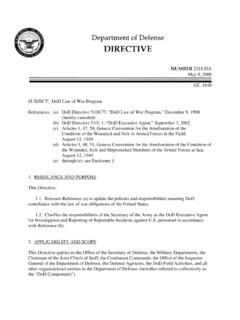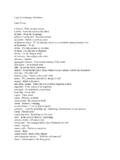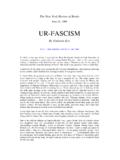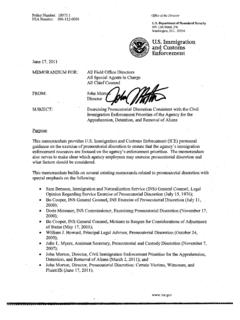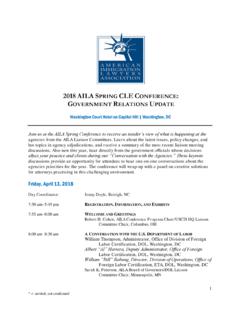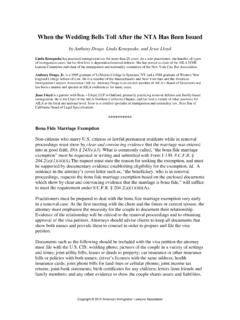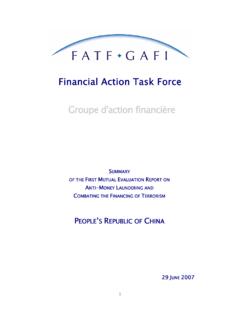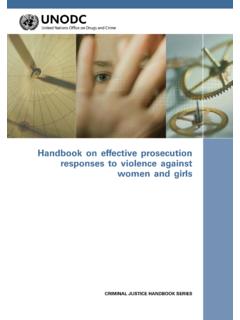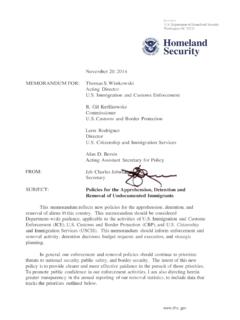Transcription of Chapter 12 - Unlawful Command Influence - PEGC
1 12-i 2001 JUDGE ADVOCATE OFFICER ADVANCED COURSE Chapter 12 Unlawful Command Influence Table of Contents I. INTRODUCTION ..1 II. INDEPENDENT DISCRETION VESTED IN EACH COMMANDER..2 III. CONVENING AUTHORITY AS ACCUSER..4 IV. INFLEXIBLE ATTITUDE MAY DISQUALIFY CONVENING AUTHORITY..5 V. COURT MEMBER VI. NO OUTSIDE PRESSURE..7 VII. WITNESS VIII. PRETRIAL PUNISHMENT MAY RAISE Unlawful Command Influence ..9 IX. INDEPENDENT DISCRETION OF MILITARY JUDGE..9 X. RAISE ISSUE IMMEDIATELY..10 XI. YOUR CONCERNS AS A NEW JUDGE XII. CONCLUSION..12 LTC Robert A. Burrell December 2000 12-ii 12-1 2001 JUDGE ADVOCATE OFFICER ADVANCED COURSE Unlawful Command Influence Outline of Instruction I.
2 INTRODUCTION A. References 1. Manual for Courts-Martial, United States (1995)[hereinafter MCM). 2. Uniform Code of Military Justice [hereinafter UCMJ] arts. 1, 25, 37, 98. 3. Dep t of Army, Reg. 27-10, Legal Services, Military Justice, paras. 5-9, 5-10c (24 June 1996) [hereinafter AR 27-10]. B. Keys to understanding Unlawful Command Influence (UCI). 1. See the commander as a judicial authority. Be aware that UCI may be actual or apparent. 2. Public interest; high-profile cases, politics. 3. The exercise of UCI is not limited to commanders. 4. Independent discretion of 3 key population groups: a. Court Members b.]
3 Subordinate Commanders c. Witnesses 12-2 5. Dispute over whether, extent to which Art. 37 applies to accusative stage. See United States v. Drayton, 45 180 (1996). II. INDEPENDENT DISCRETION VESTED IN EACH COMMANDER. A. Each judicial authority, at every level, is vested with independent discretion, by law, which may not be impinged upon. There is no need to dictate dispositions to a lower-level commander. B. Lawful Command Actions. The commander MAY: 1. Personally dispose of a case if within commander s authority or any subordinate commander s authority. 306(c). 2. Send a case back to a lower-level commander for that subordinate s independent action.
4 403(b)(2), 404(b), 407(a)(2). Superior may not make a recommendation as to disposition. 401(c)((2)(B). 3. Send a case to a superior commander with a recommendation for disposition. 401(c)(2)(A). 4. Withdraw subordinate authority on individual cases, types of cases, or generally. 306(a). 5. Escalate a lower disposition. 601(f) ( Except as otherwise provided in these rules, a superior competent authority may cause charges, whether or not referred, to be transmitted to that authority for further consideration, including, if appropriate, referral. Accord United States v. Blaylock, 15 190 ( 1983). EXCEPTIONS: a. An executed Article 15 for a minor offense.))
5 907(b)(2)(D)(iv), MCM, Part V, para 1e. See United States v. Hamilton, 36 723 ( 1993) (permissible for superior commander to prefer charge for a major offense even though accused already received Art. 15 for the offense). 12-3 b. After evidence is presented at trial, extremely limited authority to escalate disposition, , urgent and unforeseen military necessity. UCMJ, art. 47 (former jeopardy); 604(b), 907(b)(2)(C). C. Recurring mistakes: 1. Advice before the offense (Policy Letters). Cannot, , suggest reduction and $500 for NCOs, as a starting point for NCOs involved in alcohol-related offenses with no personal or property injury.
6 Base commander published range of appropriate punishments for alcohol offenses, to be individualized under the guidelines of the UCMJ. United States v. Martinez, 42 327 (1995). See also United States v. Hawthorne, 22 83 ( 1956) (Policy of GCM for soldiers with two prior convictions constitutes Unlawful interference with subordinate s independent discretion). 2. Advice after the offense. a. Improper for battalion commander to return request for Article 15 to company commander with comment, Returned for consideration for action under Special Court-Martial with Bad Conduct Discharge. United States v. Rivera, 45 582, 583 ( 1972).
7 B. See United States v. Gerlich, 45 309 (1996). COL bde commander/SPCMCA ordered subordinate (MAJ) to set aside Art. 15 after COL received letter from CG (who had received critical letter from IG) directing reinvestigation. Court set aside findings and sentence, notwithstanding COL s and MAJ s claims of continued independence, based on recognized difficulty of a subordinate ascertaining for himself/herself the actual Influence a superior has on that subordinate. 12-4 c. But see United States v. Wallace, 39 284 ( 1994). Superior learned of additional misconduct by the accused and told subordinate commander, You may want to reconsider the Article 15 and consider setting it aside based on additional charges.
8 Court, relying on fully developed record at trial, agreed with trial judge that subordinate exercised his own independent discretion when he preferred charges. Id. at 286-87. III. CONVENING AUTHORITY AS ACCUSER. A. Accuser is person who signs and swears charges, any person who directs the charges nominally be signed and sworn to by another and any person who has an interest other than an official interest in the prosecution of the accused. UCMJ art. 1(9). 1. Test is whether under the circumstances a reasonable person would impute to [the convening authority] a personal feeling or interest in the outcome. United States v. Gordon, 2 161, 166 ( 1952).
9 2. Convening authority who possesses more than an official interest must forward the charges to a superior competent authority for disposition. UCMJ, art. 22(b), 23(b) (GCM and SPCM respectively); United States v. Gordon, 2 161, 166 ( 1952)(GCMCA was victim of burglary); United States v. Jeter, 35 442 ( 1992)(accused attempted to blackmail GCMCA); United States v. Dingis, 48 ___ (1998). Dubay hearing ordered to determine whether SPCMCA, who forwarded case to GCMCA with recommendation for GCM, had sufficient personal interest in the case to be disqualified as a convening authority. B. Exceptions: 1. Violations of general regulations.
10 United States v. Doyle, 26 82, 85 ( 1958). 2. Article 15s. 3. Summary Courts-Martial. 1302(b). 12-5 C. Disqualified SPCMCA must disclose disqualification even when forwarding charges to GCMCA with recommendation for GCM. United States v. Nix, 40 6 ( 1994). IV. INFLEXIBLE ATTITUDE MAY DISQUALIFY CONVENING AUTHORITY. A. Pretrial (generally not disqualified). 1. Pretrial referral is a prosecutorial function, not a quasi-judicial function. Cooke v. Orser, 12 335 ( 1982). 2. United States v. Treakle, 18 646, 654-55 ( 1984)( We do not agree .. that a convening authority can be deprived of his statutory power to convene courts-martial and refer charges to trial based on lack of judicial temperament ).
